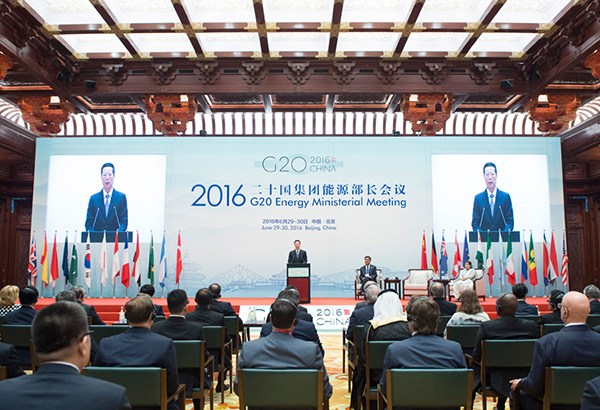
Chinese Vice Premier Zhang Gaoli addresses the opening ceremony of the G20 Energy Ministerial Meeting in Beijing on June 29, 2016.(Photo/Xinhua)
Designed to build a sustainable, steady global economic order, the Group 20 is playing an increasingly important role in global governance, as are many non-governmental organizations, which range from chambers of commerce to think tanks.
The latter, in particular, are expected to contribute more to the world economy that is painstakingly recovering from the financial crisis of 2008 and the European Union's sovereign debt crisis. That the United Kingdom voted to relinquish its European Union membership last month has dealt an even bigger blow to the already slow global recovery.
As history has repeatedly proved, innovation-driven development is the key to putting global growth back on the right track. It requires governments to create an innovation-friendly environment for NGOs, which in turn, need to make the most of their potential by implementing tailored innovative strategies. That is exactly what the Chinese government is trying to achieve in the nationwide promotion of mass innovation and entrepreneurship.
NGOs also serve as a bridge between governments and market players in the battle against poverty, a major challenge faced by all countries, be they rich or poor. The United Nations has made poverty alleviation a prime mission and pledges to get rid of extreme poverty by 2030.
All economies, especially the G20 members that are home to almost half of the world's impoverished population, are obliged to put more efforts into facilitating tax reform and reducing inequalities. NGOs have great potential to not only counsel governments to make sure poverty alleviation funds are in the right hands, but also make the most of idle money.
In dealing with issues such as energy inefficiency and climate change, some non-governmental forces' active participation is also a boon to the shared pursuit of sustainable development.
The just concluded G20 Energy Ministerial Meeting in Beijing has passed a communique and three other plans, which encourage G20 members to formulate development strategies and action plans to boost renewable energy investment and consumption. A pledge was also made to further implement the Paris Agreement on Climate Change, a landmark deal jointly signed by over 170 countries at the UN headquarters on Earth Day on April 22.
The inclusion of NGOs in these efforts as both supervisors and participaters, to some extent, can significantly improve transparency and efficiency. For one, a green finance research group, co-sponsored by the People's Bank of China, the country's central bank, and the Bank of England, has made notable progress in promoting green funds and bonds, as well as offering financial support to the fight against climate change.
Against the backdrop of rapid globalization, global governance is more about open-minded, candid cooperation between governments, international groups, NGOs, and enterprises. Among them, a number of talents with no government background are in possession of abundant firsthand information, which means a lot to policymaking. Besides, NGOs can often play a flexible role in transnational trade negotiations, thanks to their neutral position.
As the world's largest trader and second-largest economy, China is supposed to contribute more to and have a bigger say in the international affairs. Encouraging its NGOs to take part in overseas humanitarian rescues, as many of them have done in Ecuador and Nepal after the massive earthquakes in these countries is a good start.
The author Liu Ying is a researcher at Chongyang Institute for Financial Studies, Renmin University of China.


















































